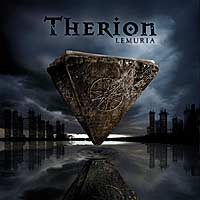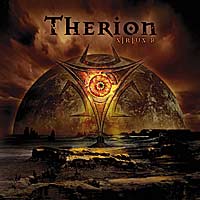|
|
|||
|
excerpts from the twin album
Lemuria Thyphon Uthark Runa The Dreams Of Swedenborg An Arrow From The Sun Feuer Overtüre/Prometheus entfesselt
Sirius B Blood Of Kingu Son Of The Sun The Khlysti Evangelist Kali Yuga Part1 Kali Yuga Part2 Call Of Dragon Sirius B |
Christofer Johnsson - guitars Kristian Niemann - guitar Johann Niemann - bass
More than 170 musicians involved
|
||
|
|
|||
release date 24th May |
|||
|
|
|||
|
preview- review by Marco "Norman
Knight" Signore____ Back
is the Megatherion! The magnificent nordic combo returns after the valid
double live album with a twin project that is at least comparable with
the previous best productions of Therion. It is pretty meaningless
trying to resume in few words the background of a band that must be
considered one of the pillars of heavy metal music. And yet, after more
than a decade of extremely good symphonic productions, Therion seem to
have more than just few surprises for us. This preview will of
course take into account only few tracks from each of the albums due to
be released, the first named Lemuria and the second Sirius B.
With
Uthark Runa we are
greeted by a choir repeating the obsessive, rhythmic refrain that frames
the excellent vocals as the scratching and characteristic voice of Mats
Levén speaks of ancient nordic signs that return to life. And among
the majestic choirs and the atmospheric guitars this song almost takes
the legacy left by “Secret of the Runes”… “decipher the signs
from the North” this is the invitation that Therion bestow upon us.
Needless to say the power of their symphony moves our deepest cords to
follow this invitation… and run with our fantasy towards the eternally
grey shores of Norse reigns lost in the mists of time. A
delicate acoustig guitar arpeggio introduces the splendid voice that relates us the tale of Lemuria,
the kingdom under the waves, and this mesmerizing tale is only enriched
by the other instruments and voice that enter in a soft and yet marked
crescendo of gloomy atmosphere reminiscent of the ethereal Ljusalfheim from “Secret of the Runes”. And all in all this song
has the same oniric atmospheres that can only be used to tell of the
Light Elves or, as in this case, of the undersea lost kingdom; the song
is preciously concluded by a nice flute solo. We
come out from the dream under the waves only to be brought on the wings
of another dream, this time the Dream
of Swedenborg that starts as any other dream… with delicate
steps into a treacherous ground that transforms itself into a powerful
and yet never harsh ballad where the vocals create patterns like those
on the intricate decorations of the Norse, where the acoustic guitar
once again becomes dominant, and leads the dance of strings and drums
that transport us on an ideal drakkar of music towards Swedenborg, whose
oar strikes are marked by the guitar solo that end the song in a fade
out that only leaves us asking for more. And
An Arrow
from the Sun is what we asked for. Again we are greeted by
the embracing female voice , that sings along with the choir on a carpet
of acoustic chords and repeated palm-muted electric, and then – here
it comes, the arrow, in the form of marked drums and brief guitar riffs
that introduce a deep male voice telling us of the birth of the sun.
Quite an unusual song this one, with good effect use and the great choir
work that creates the land upon which the scorching arrow from our
yellow star finds its mark in the beautiful refrains of Johnsson marked
by a series of stopped acoutic chords that really stand out in the soft
carpet of other instruments and voice, but never being too oppriment or
too present. And from the electric guitar in palm muting we are brought
before the last song from Lemuria.
This is a symphonic and grand piece of orchestral score called Feuer
Overtüre / Prometheus entfesselt. The fire of the title is latent
in the bass vocals singing in German as the track lifts off from the air
like the flames flickering from a great fire and ascends in the skies
telling the tale of Prometheus under a bass/drum work that is really
impressive and marking the excellent guitar work of both Johnsson and
Niemann. As the other intruments make their entrance the song becomes a
true masterpiece in the latest Therion’s style, and again mixing the
new way (like Secret of the Runes
itself) with the old one (the immortal times of Theli). From
this first listening emerges the new direction of Therion’s melodies
A
driving and powerful guitar riff introduces Son
of the Sun that brings us to a closer land… we
are still 3000 years before Christ and bow down towards the almighty
gaze of the Pharaoh, the Se-Re (Son of the Sun) whose life meant the
life of the Tawi, the Two Lands… and whose death meant ascendance
towards his Father and his Divine Relatives as his body started the
eternal journey from the mummified form in the pyramid, petrified rays
of the Sun – this song drives us in the same way that the
life-giving rays of the sun lead the Egyptians towards the most
fascinating and complex of all ancient cultures. The
fine electric guitar of Johnsson only adds pathos to the song as the
china cymbal of the new Therion drummer carry us to the final refrain
closed by the immediate and striking riff that opened the song. We
then move to Russia and follow the Orthodox heresy of the Khlysty, the
“Sons of God”, as the vocal power of the choir weaves in music and
notes the gelid and frozen thundra introduce us to The
Khlysti Evangelist, only to explode once again in a powerful
heavy metal riff with driving bass/drum work marked by a very dark
distortion of the guitars, that would not be out of place in a Symphonic
or Prog metal album. The aggressive lead vocals come from Mats
Levén and we are but forced to stay transfixed by the river of notes
that really gives us flashing images of torchlit monasteries lost in the
frozen white thundra of Russia. And the ice and snow that threaten our
life and sanity is cracked by the violent and symphonic guitar solo that
precedes the return of the lead vocals. Certainly this is one of the
best songs of this album. It
is significative that the next son is titled Kali
Yuga, the “Age of Iron” of Hindu
cosmology. This song is actually composed of two part. The Part
One is opened by a cadenced drum that marks a very “Therion-like”
riff of guitar that however carries inside the seeds of music, as the
voice, crackling in a sort of crunch effect, intermingles with the sound
of the electric guitars only to find freedom in the refrain, announcing
the Kali Yuga, the present age, the final and most negative of the four
Yugic Cycles… and as the choir heralds the coming of this age, the
guitar explodes in the Part Two, maybe the most aggressive song in this
promo, with choirs again marking a fierce musical landscape that the
strings cannot (and maybe don’t want to) mitigate. And this song is a
crescendo of anxiety and uncertainty marked by the anguish of the chord
sequence, worthy of the best Therion production indeed. The
finale is really grand, making this maybe the most beautiful song of the
album, as the violins form patterns with the voices guided by the
omnipresent and serrated drums and bass. “Living in Kali Yuga, in the
dark night of the soul” repeats the vocal work as the song comes to an
end of powerful music crowning this masterpiece of the “Age of
Iron”. In
Call of
Dagon we find perhaps the most symphonic song of this promo,
a continuous flow of notes built on a solid and yet ever flowing stream
of pedal horns and strings that actually sound like a call of some sort;
in this case the the call is issued forth from the Philistine God Dagon
– the God of the Waters and Sea. It is of no small significance that
the song itself resembles a liquid body flowing onward, a river, or
perhaps the flow and ebb of the tide – the Domains of Dagon in any
case. Once again, Therion managed to put in music what has been muted by
the sands of time, painstakingly providing us with the feelings that
maybe the Ancient Ones felt by thinking about this Master of Waters. The
last song of this promo is the dark and obscure almost as its title, Sirius
B, “he who reigns on the void”, as the Egyptians called
it – without consciously knowing its presence as the dark companion of
the star Sirius. The song is dark and full of mysterious echoes, with a
bass voice obsessively repeating a single vocalism (in this song I have
found faint reminiscences of Robert Berry’s “The Aiel Approach”), a gloomy and ominous conclusion to this
perfect album. All
in all there are very few words to say… if this
cannot be considered a masterpiece, then what
else may be? Therion totally devastate our senses once again
and confirm their preminent and unique position as the harbingers and
heralds of the true symphonic heavy metal. Hail to
the Ones! To Megatherion!
|
|||
| Marco
Signore |
|||
|
|
|||
|
zum
Seitenanfang
|
|||
© GryphonMetal.ch June
2001-2007
|

 Of
a different atmosphere seems to be Sirius
B, whose title honours one of the oldest and deepest mysteries of
mankind; more aggressive, more heavy metal oriented, and a bit less
symphonic than Lemuria. And
here… the few initial notes of Blood
of Kingu carry us in the old Fertile Crescent as the second Husband
of Tiamat is killed by Marduk, in a driving and relentless song that
haunts the listener, almost painting the horizon with the living blood
that created humankind, and the music created by Johnsson and company
transport us in the eternal struggle between the forces of Chaos and
Order
Of
a different atmosphere seems to be Sirius
B, whose title honours one of the oldest and deepest mysteries of
mankind; more aggressive, more heavy metal oriented, and a bit less
symphonic than Lemuria. And
here… the few initial notes of Blood
of Kingu carry us in the old Fertile Crescent as the second Husband
of Tiamat is killed by Marduk, in a driving and relentless song that
haunts the listener, almost painting the horizon with the living blood
that created humankind, and the music created by Johnsson and company
transport us in the eternal struggle between the forces of Chaos and
Order